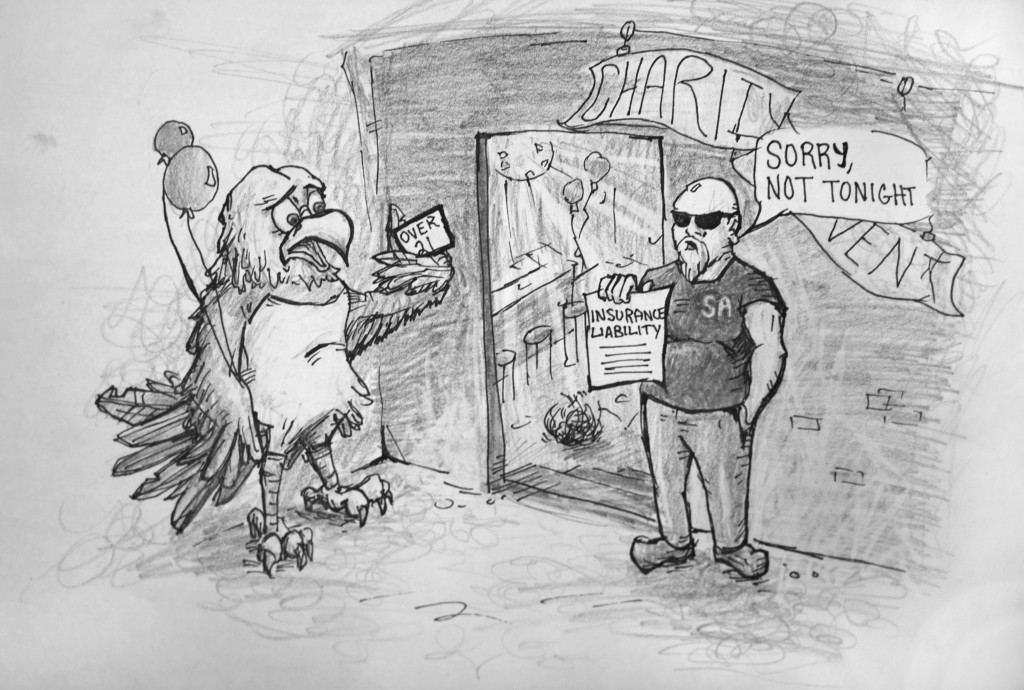
 The recent emphasis on enforcement of the policy regarding Student Association (SA) club’s advertising and hosting fundraisers at establishments that serve alcohol have us at The New Paltz Oracle both in a state of sober understanding and questioning.
The recent emphasis on enforcement of the policy regarding Student Association (SA) club’s advertising and hosting fundraisers at establishments that serve alcohol have us at The New Paltz Oracle both in a state of sober understanding and questioning.
At the April 17 student senate meeting, Vice President of Academic Affairs and Governance Ayanna Thomas announced in her weekly report that clubs and organizations will need to adhere to a new contract that addresses a liquor liability issue when filling out their semesterly charters. Essentially, the contract would reinforce the guideline that prohibits SA sponsored clubs and organizations from advertising with or hosting events in establishments that serve alcohol.
Of course, it is prudent to recognize the issue of insurance and accountability that comes with serving alcohol at events. Since organizations on campus are sponsored and work through SA, in the end any wrong doing — and consequences that come along with those faults — falls on the back of our student government.
If the SA were to be dragged into litigation, it would essentially bankrupt their budget and force them to suspend many of the events and services that we as students expect of our school.
We all know that alcohol tends to bring out the wilder side in all of us, sometimes leading to less than ideal outcomes. It is only fitting that SA would hope to distance themselves from any insurance or liability issues that may arise from these situations. Their insistence on clubs adhering to this rule makes total sense.
However, there are points of this contract that are puzzling.
Technically, SUNY New Paltz is not a dry campus. As part of the campus regulations listed on newpaltz.edu, this is clearly outlined. The regulation states “no person shall use, possess, sell or give away alcoholic beverages without proper authorization in any building or on any property owned…by the college.” It also states that any person over the legal drinking age may possess alcoholic beverages in “moderate amounts” in their residence hall room or suite. Of course, this is not a direct correlation to the guidelines that SA clubs must adhere to, but it shows the level of understanding the college as a whole has for drinking.
If this is our campus’ policy, it seems farfetched to outlaw any interaction with establishments that serve alcohol. To enter a bar and drink alcohol, you need to be over 21 years old. If this law is not enforced by the places SA organizations decide to host events, it is not the fault of the club but the establishment they are in. In fact, by having clubs sign the new contract, it would essentially absolve the SA from any wrong doing -— the fault would lay with their clubs.
Many clubs use this privilege, which serve as an immensely popular activity that attracts numerous people — who wouldn’t normally attend — to events, as a way to collect money and further their goal. Let’s face it: with everyone’s shrinking budgets, it makes sense that clubs would want to make money in a swift manner. If liability is an issue, would it be difficult to make anyone attending an event sign a waiver before attending an event that even further protects the SA?
Clubs that rely on advertising from outside sources in the town and village will also suffer from this contract. When half of New Paltz’s Main Street is littered with bars, clubs that are desperate to find willing advertisers are limited to only those that do not have alcohol. If a restaurant serves alcohol are they banned too?
Although all of these options may carry weight, in the end the SA is tied to their insurance provider who outright prohibits any interaction between alcohol-serving establishments and the organizations the SA is under. In the end, each club is under the umbrella of SA and needs to be aware of the rules they are expected to follow.
Again, we can’t stress enough that the SA’s contract is not an attempt to stifle organizations. Their reasoning behind the tougher sanctions seem to be purely motivated toward limiting their exposure to liability issues. However, we hope that they do not take their decision lightly, as many organizations pledging fidelity to them could now suffer.
